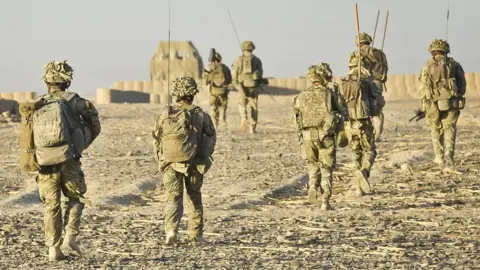Government under pressure to reveal Afghan refugee plan
 PA
PAThe UK government is being urged to help provide safe routes out of Afghanistan for people at risk from violence and reprisals by the Taliban.
Labour leader Sir Keir Starmer said there was an obligation to help those who had aided UK forces, and a need to "assert the human rights of everyone".
Parliament is to be recalled on Wednesday to discuss the situation.
The government says it has capacity to remove at least 1,000 people a day from Afghanistan and is promising new plans.
Asked how many refugees the UK would take from Afghanistan, Foreign Secretary Dominic Raab wouldn't give a figure, but said "we are obviously a big-hearted nation" and added that the government was "working very carefully on what kind of further commitment we might make".
Mr Raab said "everyone" had been "caught by surprise by the pace and the scale of the Taliban takeover" in Afghanistan.
He said 150 British nationals are due to arrive in the UK in the early hours of Tuesday morning, and that there would be 350 further arrivals of both British and Afghan nationals in "the days that come".
This is in addition to the 289 Afghan nationals that have been "delivered" over the last week, he said.
The BBC has been told that officials are looking at a response similar to the Syrian resettlement scheme from 2014 - which saw the UK accept refugees in the greatest need, including survivors of violence, and women and children.
US forces have secured the perimeter of Kabul airport, from where hundreds are trying to flee following the Taliban seizing control of virtually the whole country.
But several deaths have been reported amid chaotic scenes.
The United Nations Security Council is meeting in an effort to avert what has been described as a possible "humanitarian catastrophe".
On Monday, the Ministry of Defence said a further 200 UK troops would be sent to Kabul, to take the total British armed forces presence to 900.
It added that a "small number" of RAF aircraft are being diverted from other operations to help the evacuation effort.
But many Afghan interpreters and others who have worked with Nato forces in the 20 years since the previous Taliban government was ousted are in fear of their lives.
Speaking on a visit to Wolverhampton, Sir Keir said Mr Johnson had to "step up to the plate and show some leadership, some urgency".
He added that the UN had to make "an assertion of the human rights of everyone in Afghanistan... particularly women and girls" and reach "an agreement on safe and legal routes for refugees".

As the government scrambles to get people out of Afghanistan, ministers are engaged in an exercise of mitigation, as events unfold in Kabul beyond their control.
But they will want to show they have some sort of grip on the crisis, by successfully evacuating British passport holders - and eligible Afghans who've worked with the British authorities.
However as an emotional defence secretary today admitted, not everyone will get out.
On refugees, with many Afghans expected to try and flee, Downing Street won't give potential numbers but says it will set out its approach to wider asylum claims in the coming days.
More broadly, the government is still insisting that, once the Americans decided to go, it wasn't feasible for the UK to stay and act unilaterally.
But this, as well as Britain's broader approach to foreign policy over the last two decades, will all be up for discussion when Parliament is recalled on Wednesday. That may feel a little late as, in Afghanistan, things seem to be changing hour by hour.

Sir Keir also said: "We need to get UK nationals out. But we also have an obligation to all of those Afghans who helped and assisted the UK.
"We shouldn't have nice distinctions between this type of help and that type of help. If those in Afghanistan have helped us, the UK, in our work in Afghanistan, we have an obligation to them."
Last week the government said about 2,000 Afghan "people we have an obligation to" would also be transported to the UK, joining about 3,000 who have already been taken out of the country.
Defence Secretary Ben Wallace told the BBC the biggest barrier to increasing the rate of evacuation was not a lack of capacity on planes but "how quickly" people could be processed by officials.
"Our flights, our planning and coming in and out and soon if we manage to keep it in the way we're planning to, we should have capacity for over 1,000 people a day to exit to the UK," he said.
Mr Wallace also said the rules had changed to allow more contractors who had served British forces into the UK.
Further plans have been promised over the next few days.
But, appearing on LBC radio, Mr Wallace was close to tears as he admitted that "some people won't get back".
Foreign forces are pulling out of Afghanistan following a deal between the US and the Taliban militants.
The Taliban has pledged not to allow Afghanistan to become a base for terrorists who could threaten the West.
